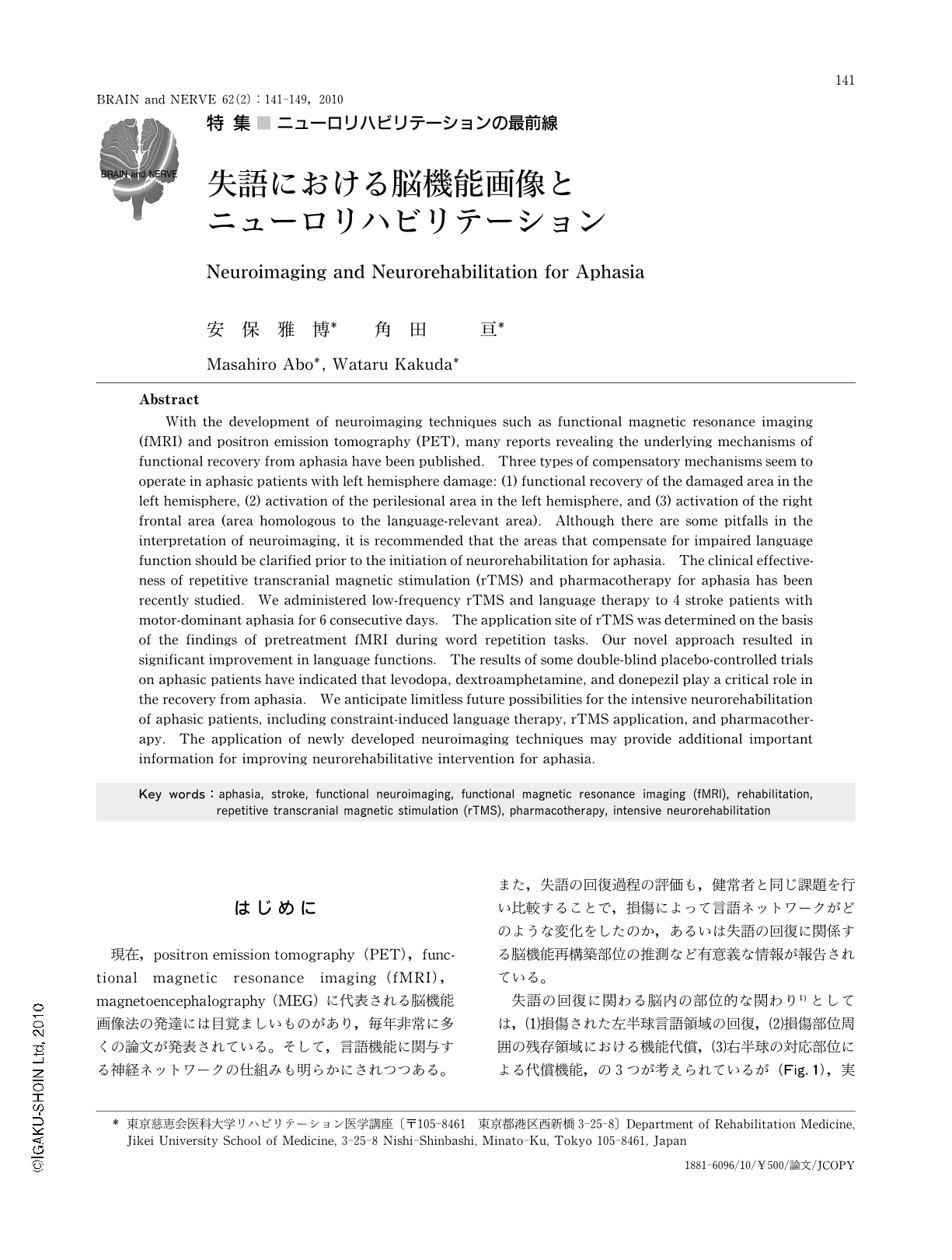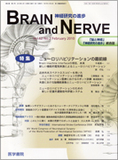Japanese
English
- 有料閲覧
- Abstract 文献概要
- 1ページ目 Look Inside
- 参考文献 Reference
はじめに
現在,positron emission tomography(PET),functional magnetic resonance imaging(fMRI),magnetoencephalography(MEG)に代表される脳機能画像法の発達には目覚ましいものがあり,毎年非常に多くの論文が発表されている。そして,言語機能に関与する神経ネットワークの仕組みも明らかにされつつある。また,失語の回復過程の評価も,健常者と同じ課題を行い比較することで,損傷によって言語ネットワークがどのような変化をしたのか,あるいは失語の回復に関係する脳機能再構築部位の推測など有意義な情報が報告されている。
失語の回復に関わる脳内の部位的な関わり1)としては,(1)損傷された左半球言語領域の回復,(2)損傷部位周囲の残存領域における機能代償,(3)右半球の対応部位による代償機能,の3つが考えられているが(Fig.1),実際には,それぞれの病態や損傷において,最も効果的な機能が働いていると考えられる。
しかしながら,エビデンスに乏しいと言われるリハビリテーション医学の中でも,高次脳機能障害のリハビリテーションのエビデンスは,その量も質も特に不良であると言わざるを得ないのが現況である。失語は脳卒中の実に21~38%に認められる2)メジャーな高次脳機能障害であるにもかかわらず,明確な有効性を証明されたと言えるようなリハビリテーションは存在しない。
その理由3)として,(1)言語は全人格的な機能であること,(2)失語そのものが多様であること,(3)倫理上の問題もあり厳格な対照研究が難しいこと,(4)急性期は回復の通過時期でもあり,自然回復や失語タイプの移行があり本質的問題点がつかみにくいこと,(5)訓練外で言語の無刺激ではないことなどが挙げられる。
また,失語においてもその程度や回復,治療効果の判断などに適切な評価が重要であることは言うまでもない。疫学的には,失語は発症後2週間~3カ月までの改善が著明であり4,5),その後も改善度は低下するものの1年程度は緩徐に改善6),結果的に失語症状の40%は1年でほぼ完全に戻るとされている7,8)。また,発症時の重症度によって最も改善するタイミングも異なり9),最終的な改善に対する最大の予測因子は発症時の重症度であるため5,6,8,9),初回の評価は特に重要である。Davidら10)は失語訓練の有効性に対する研究において,むしろ訓練よりも患者の適切な環境設定,そのための評価が重要であるとしている。
脳卒中による上肢麻痺11)では,重度麻痺の場合11週で,軽度麻痺の場合6週で95%プラトーになるのに対して,言語機能の回復はなぜ四肢の麻痺より遅いのか?という疑問がある。これに対する答えとしては,(1)言語は高次脳機能であること,(2)純粋に“脳機能そのもの”の回復であること,(3)真に科学的な治療法の確立と障害に応じた適切なプログラムが未完成であることなどが挙げられる3)。失語における脳機能画像とニューロリハビリテーションを考える場合,上記のことを加味しなければならない。
Abstract
With the development of neuroimaging techniques such as functional magnetic resonance imaging (fMRI) and positron emission tomography (PET),many reports revealing the underlying mechanisms of functional recovery from aphasia have been published. Three types of compensatory mechanisms seem to operate in aphasic patients with left hemisphere damage: (1) functional recovery of the damaged area in the left hemisphere,(2) activation of the perilesional area in the left hemisphere,and (3) activation of the right frontal area (area homologous to the language-relevant area). Although there are some pitfalls in the interpretation of neuroimaging,it is recommended that the areas that compensate for impaired language function should be clarified prior to the initiation of neurorehabilitation for aphasia. The clinical effectiveness of repetitive transcranial magnetic stimulation (rTMS) and pharmacotherapy for aphasia has been recently studied. We administered low-frequency rTMS and language therapy to 4 stroke patients with motor-dominant aphasia for 6 consecutive days. The application site of rTMS was determined on the basis of the findings of pretreatment fMRI during word repetition tasks. Our novel approach resulted in significant improvement in language functions. The results of some double-blind placebo-controlled trials on aphasic patients have indicated that levodopa,dextroamphetamine,and donepezil play a critical role in the recovery from aphasia. We anticipate limitless future possibilities for the intensive neurorehabilitation of aphasic patients,including constraint-induced language therapy,rTMS application,and pharmacotherapy. The application of newly developed neuroimaging techniques may provide additional important information for improving neurorehabilitative intervention for aphasia.

Copyright © 2010, Igaku-Shoin Ltd. All rights reserved.


